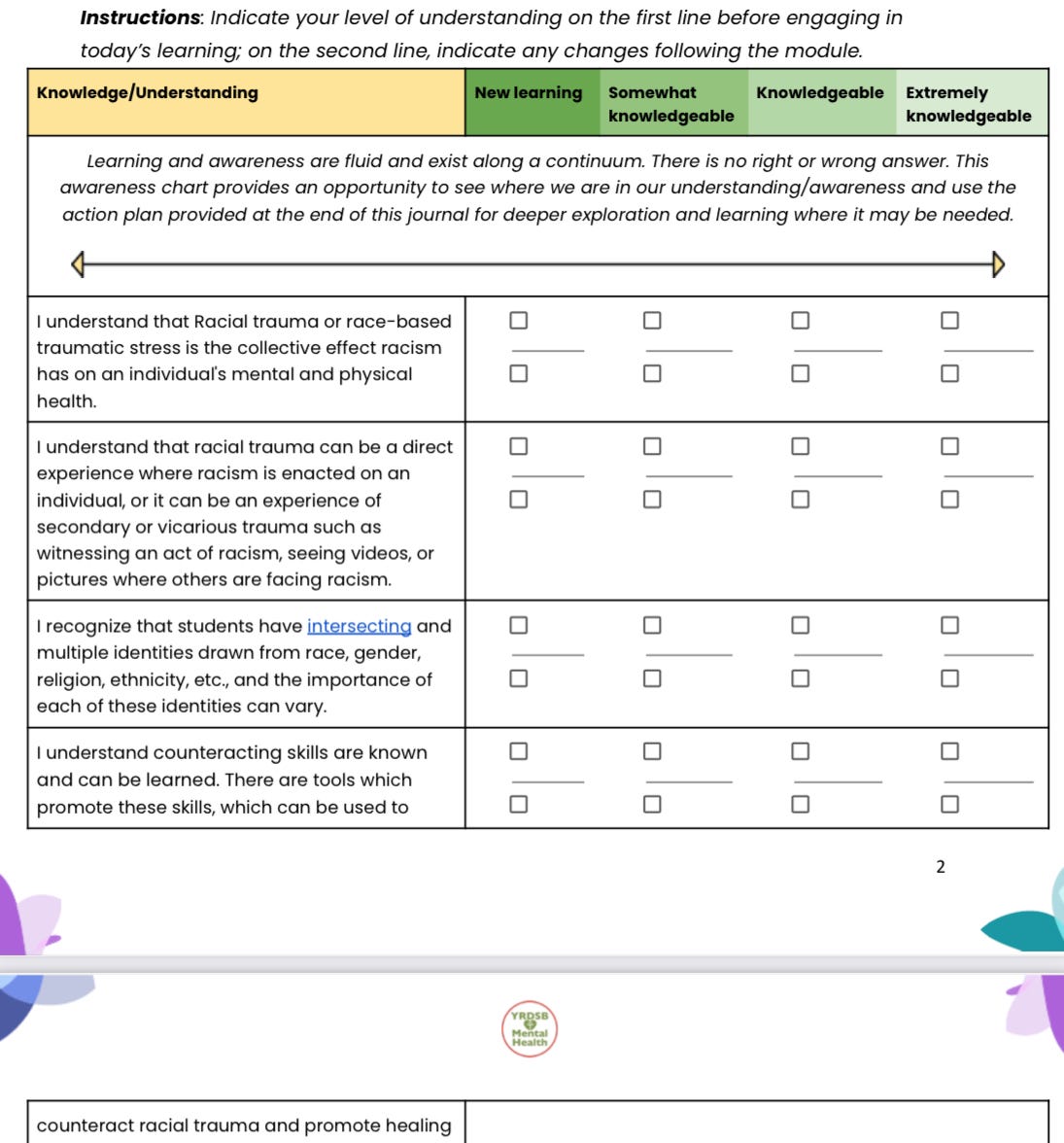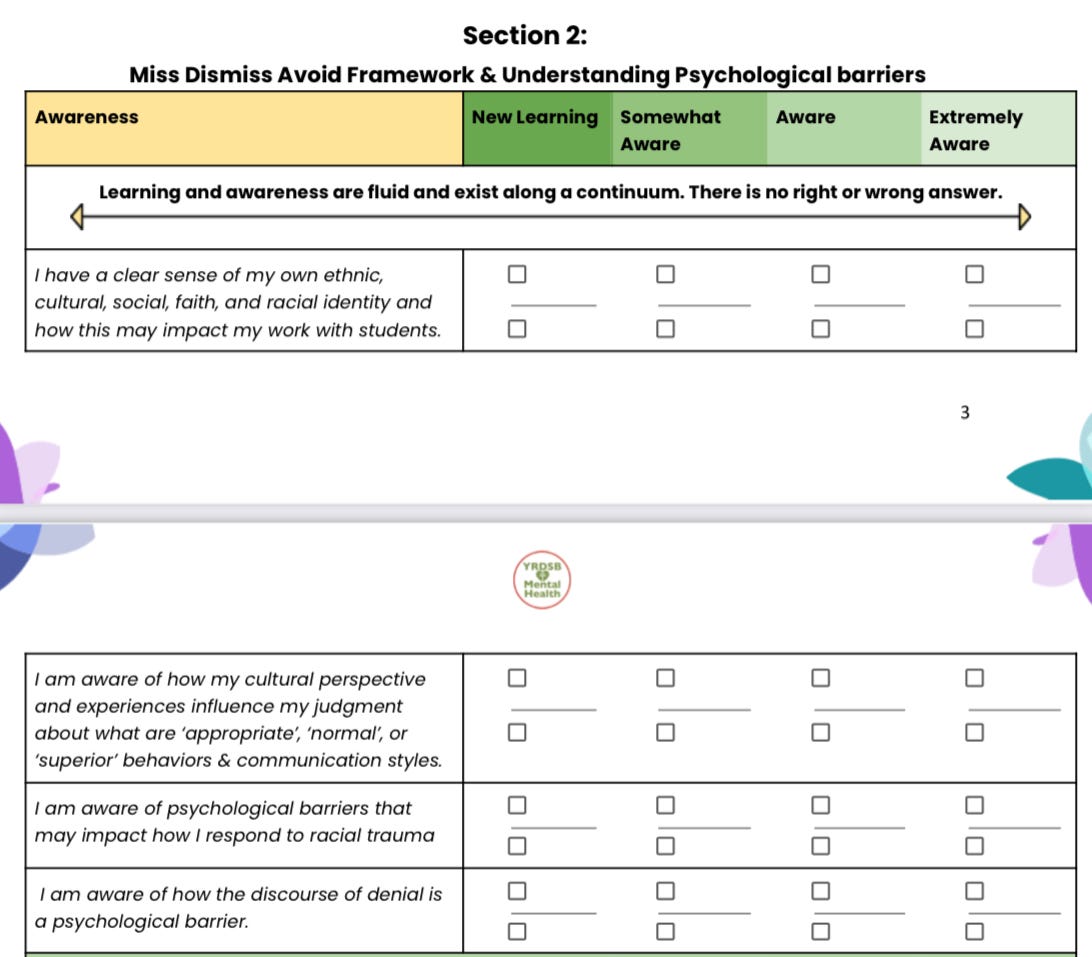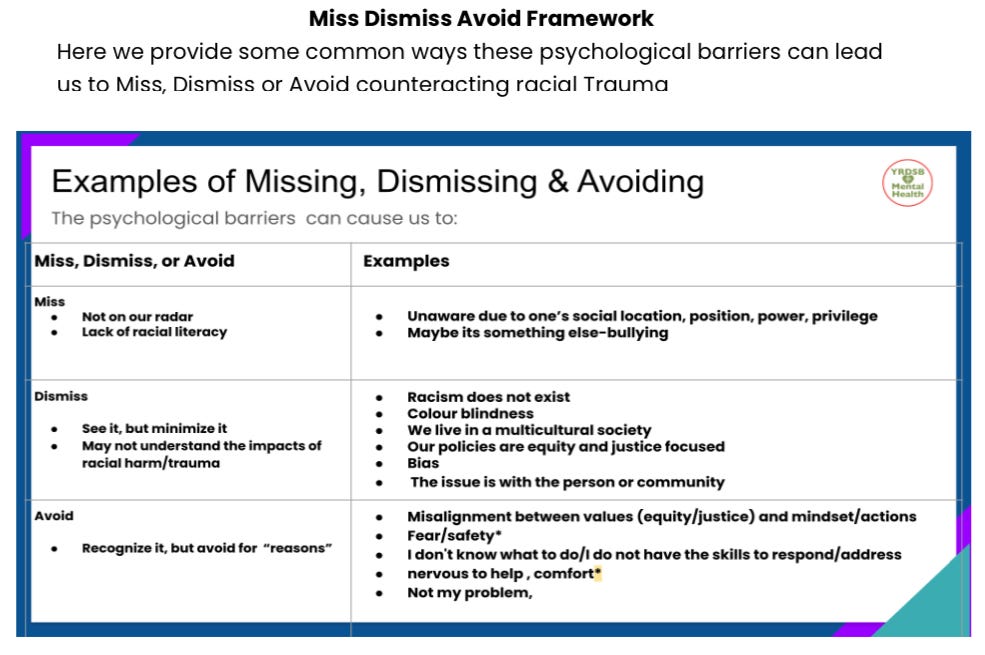Workplace Indoctrination Day at the York Region District School Board
Why are we still calling them "Professional Development" days, anyway?
I’d like to give you a taste of what elementary teachers at the York Region District School Board (YRDSB) got up to last Friday, October 20th.
The material I’m going to show you might actually be quite amusing, if it were part of an April Fools skit done 15 years ago, but unfortunately, it is October 2023, and the YRDSB is dead serious.
EQAO results from last spring indicate only 50% of grade 6 students in Ontario met the provincial standards in math, and guess what the board decided to focus on, yet again? …You guessed it: “racism.”

Racism. A word which now requires quotation marks half the time, because as anyone who has been paying attention knows, for some, the term is now defined in a whole new way.
In fact, the document YRDSB teachers received during the session states that “Colour Blind Ideology” — a pejorative spin on “racial colour blindness”, defined as “the belief that a person’s race or ethnicity should not influence their legal or social treatment in society” — is “a form of racism.”
Whether or not not being racist is racist is a conversation for another day, though.
Let’s assume what the board has to say about racism is reasonable. Should all teachers be expected to view these complex issues the exact same way?
Apparently so. Apparently, certain people at the school board already know all the answers, so there is simply no need for teachers — or, by extension, students — to think and share their own thoughts. In our K-12 schools today is where reason and genuine appreciation for diversity of thought go to die.
In his book Intellectuals and Society, Thomas Sowell explains that “whole academic departments” (such as gender studies, black studies, etc.), where this all originated, are similarly uninterested in the pursuit of truth, and devoted instead to “particular, prepackaged conclusions.”
He then makes the following crucial point:
Critics of ideological indoctrination in schools and colleges often attack the particular ideological conclusions, but that is beside the point educationally. Even if we were to assume, for the sake of argument, that all the conclusions reached by all the various “studies” are both logically and factually valid, that still does not get to the heart of the educational issue. Even if students were to leave these “studies” with 100 percent correct conclusions about issues A, B and C, that would in no way equip them intellectually with the tools needed to confront very different issues X, Y and Z that are likely to arise over the course of their future years. For that they would need knowledge and experience in how to analyze and weigh conflicting viewpoints.
Even if the teachers and students at the YRDSB were being spoon fed the best solutions for handling problem A (they aren’t), what will they do when problem B comes around?
On Friday, each elementary teacher, EA and caretaker (janitor) at the YRDSB was given a 15 page “reflection journal” to fill out as they all watched a 45 minute video on “disrupting racism,” which was paused multiple times throughout for writing responses and discussing as a group.
Before the video started, teachers were asked to evaluate their “level of understanding” for several items in the two tables below, and instructed to “indicate any changes following the module.”
Notice that there is no checkbox for “I disagree with the assertion/premise.” The options are: New learning, Somewhat knowledgeable, Knowledgeable, Extremely knowledgeable.
Essentially, they are presenting a set of statements with ideological assumptions/undertones baked in, and asking: “Do you agree now, or will you agree later?”
How would you respond?
Here is part 2:
In other words, do you have a “clear sense” of your own “racial identity” yet, or will you be working on building that awareness? Are you aware, yet, that “discourse of denial” (i.e., disagreement), is a psychological barrier?
This stuff is highly psychologically abusive, and it makes me sick.
The document then delves into the “ideology of whiteness” which it defines so vaguely that it could mean both everything and nothing at all:
This ideology [of whiteness] is not specific to a group of people or skin colour. The ideology of whiteness is based on individual beliefs, values, behaviours, habits and attitudes, that anyone can hold, and is a result of social and cultural processes. These beliefs and attitudes result in the unequal distribution of power and privilege based on skin colour (as noted by Frye, 1983; Kivel, 1996).
It continues:
This ideology is a psychological barrier because it is “unnoticed unless examined” through persistent reflection and mirror work.
Unless you really do the work of seeing everything through the lens of race, power and oppression, you might not be able to notice the ideology of whiteness at all! It’s easy to see how anyone with the mindset of a lonely child who is deeply motivated by the prospect of becoming a teacher’s pet might well be tempted to start seeing and pointing out “whiteness” everywhere to show how much of a hard worker they are. Just saying.
Staff members were then presented with “common ways” the psychological barrier of whiteness can get in the way of having particular views about racism (table below). If you don’t see things the politically correct way - don’t worry teacher, it’s not you, it’s just that nasty thing called “whiteness”! Shut up and learn what you’re allowed to say.
After being asked to provide more examples to add to the above table, teachers view two videos of staff/students acting out scenarios, and are then asked, among other things, to evaluate whether the psychological barrier of “whiteness” might be at play in the situation (see below).
The next section focuses on how to “respond to and support” students and colleagues who experience racism and racial trauma. They recommend teachers check out pages 3 and 4 of this info sheet by School Mental Health Ontario.
Here are some of the recommendations found there:
“Be cognizant of your positionality, power, and privilege (e.g., race, gender identity, settler status, socio-economic status, etc.)”;
“Consciously be aware of your preconceived notions and biases, and how they influence how you are listening”;
“Ensure that students' wishes are respected and that they guide the plan of action that they believe is best for them”;
“Act with and for students to support in naming and dismantling oppressive policies and practices, such as removing barriers to accessing support”;
“Consult with and engage community agencies and other culturally relevant supports when needed”.
I also want to point out that according to the glossary, “racial trauma” can refer to a mental and emotional “injury” brought on by “an encounter with racial bias,” and that can lead to “race-based traumatic stress injury.”
Though the board is located in Ontario, Canada, the definition for “racial trauma” also notes that in the United States, “Black, Indigenous and People of Color” are most vulnerable to racial trauma “due to living under a system of white supremacy.” It’s almost like they think the U.S. being “a system of white supremacy” is a fact.
A case study about a student who overheard a teacher making an unprofessional comment regarding the parenting capabilities of an African student’s parents is then presented. Despite there being nothing at all about the situation that suggests racism is at play, YRDSB staff members are asked to use to the “responding to racism” info sheet linked above to think of ways the teacher might “connect with” the student who overheard the comment, “support” the African student, and “disrupt ideologies which perpetuate harm.”
The journal ends off with a “goal-setting” section for teachers to think about how they can “promote braver and safer spaces,” and increase their “knowledge/awareness” related to this particular belief system.
Though I highlighted the main parts of the reflection journal, I encourage you to check it out in full here.
If you believe this type of ideological training for teachers is wrong, please take a few minutes to contact the 13 YRDSB trustees to make your thoughts known.
As always, thanks for reading! If you’d like to support my work, please consider becoming a free or paid subscriber, making a one time donation, and/or sharing this article!














The postmodern lives on meaningless, hollow concepts--readily seen from this constant re-inventing of "racism" in new terms, new concepts, new accusations. Building castles in the sky is all it is.
Chanel, was this session in fact delivered, as was reported in True North by Sue-Ann Levy, by the Kojo Institute (Kike Ojo-Thompson in particular)? That is the organization that drove Richard Bilkszto to despair. Here is the link to Levy's article: https://tnc.news/2023/10/19/levy-white-supremacy-lectures-yrdsb/ I ask because, considering that Kojo Institute's bullying (as confirmed by the decision of the WSIB that vindicated Richard) led to his stress, the organization should not have been hired by any board for anything. I would like to know if this was the case, as I'd like to approach Lecce about this.